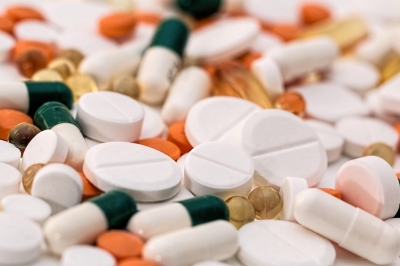Health/medicine
Maruti Suzuki trains 8.5K commercial drivers in post-accident emergency care
New Delhi, April 30 (IANS) Maruti Suzuki India on Tuesday said that it has successfully completed a pilot programme of ‘First Responder Training’ in which it trained 8,500 people, primarily commercial drivers in post-accident emergency care during the ‘golden hour’ after an accident.
Golden hour after an accident refers to the first hour after an accident during which medical intervention can reduce mortality.
To strengthen its road safety initiatives, the carmaker had partnered with the All India Institute of Medical Sciences (AIIMS), and International Road Federation (IRF) to provide first aid and trauma care training to commercial drivers at its Institute of Driving and Traffic Research (IDTR).
“The company aims to train drivers to become effective first responders during the ‘golden hour’ after accidents. Our customised programme provides practical hands-on life-saving interventions to enable drivers to handle trauma and injuries,” Rahul Bharti, Executive Officer, Corporate Affairs, Maruti Suzuki India Limited, said in a statement.
The participants received comprehensive training in emergency care in collaboration with Jai Prakash Narayan-AIIMS Trauma Center.
The training provided them with the knowledge and practical skills needed to help road accident victims during the golden hour.
“As trauma is time-sensitive, the training of bystanders who are the real first responders to any road accident can go a long way to reduce the mortality and morbidity following road traffic crashes. Usually, this group of bystanders includes drivers of commercial vehicles,” said Dr Amit Gupta, Professor at JPN Apex Trauma Centre, AIIMS, New Delhi.
–IANS
shs/uk
Health/medicine
UK infected blood scandal 'could largely have been avoided': Inquiry report


London, May 21 (IANS) A contaminated blood scandal in the UK, which has caused more than 3,000 deaths, “could largely, though not entirely, have been avoided,” according to the inquiry report on the scandal.
The report said on Monday that “a catalogue of failures” by successive governments and doctors caused the “calamity,” in which tens of thousands of patients with haemophilia and other bleeding disorders were infected with HIV and hepatitis viruses after receiving infected blood and blood products between the 1970s and early 1990s, Xinhua news agency reported.
“It may also be surprising that the questions why so many deaths and infections occurred have not had answers before now,” the report added.
The scandal has been called “the worst treatment disaster” in the history of Britain’s National Health Service (NHS).
The report also revealed that there has been “a hiding of much of the truth” by the government and the NHS “to save face and to save expense”.
Such a cover-up was “not in the sense of a handful of people plotting in an orchestrated conspiracy to mislead, but in a way that was more subtle, more pervasive and more chilling in its implications,” it said.
The scandal was linked to supplies of a clotting factor imported from the US, which used blood from high-risk paid donors.
The government announced the establishment of a UK-wide public inquiry in 2017 to examine the circumstances that led to individuals being given contaminated blood and blood products.
In 2022, the government made interim compensation payments of 100,000 British pounds (about $127,000) to about 4,000 infected individuals and bereaved partners who were registered with the country’s infected blood support schemes.
–IANS
int/khz
Health/medicine
US FDA gives nod to Musk's Neuralink to implant brain chip in 2nd person


New Delhi, May 20 (IANS) Tesla CEO Elon Musk-run brain-computer interface company Neuralink has reportedly received a nod from the US Food and Drug Administration (FDA) to implant its brain chip in a second person.
The approval for the second person to have a Neuralink chip came as the first recipient — Noland Armagh in the US — detailed his emotional journey.
The latest chip in the second recipient comes with some fixes, like embedding some of the device’s ultrathin wires deeper into the brain, The Wall Street Journal reported on Monday.
Musk or Neuralink were yet to officially react to the development.
The Neuralink chip can help restore full body control in people suffering from paralysis. The company earlier achieved a successful brain-chip implant with Armagh and began the applications for the second participant for the chip implant.
According to Musk, the company can bridge “severed nerve signals to a second Neuralink in the spine, restoring full body control”.
With the chip in his brain, Arbaugh has enabled “telepathic control of a computer or phone just by thinking”. The Neuralink trials aim to assess the initial functionality of the wireless brain-computer interface for enabling people with paralysis to control external devices with their thoughts.
–IANS
na/vd
Health/medicine
Delhi HC dismisses PIL seeking directions to medical professionals to reveal side effects of medicines


New Delhi, May 20 (IANS) The Delhi High Court has dismissed a public interest litigation (PIL) seeking a direction to all medical professionals to provide an additional slip detailing possible risks and side effects associated with prescribed medicines.
A Bench, headed by Acting Chief Justice Manmohan, said that since the legislature, in its wisdom, has elected to impose this duty on the manufacturer and the pharmacist, it would “amount to judicial legislation” if a direction is issued as prayed for in the PIL.
“It is admitted that there is no (legal) vacuum, the directions prayed for cannot be issued. Accordingly, the present PIL along with applications is dismissed,” the bench, also comprising Justice Manmeet Pritam Singh Arora, ordered.
The PIL said that the patient has a right to make an informed choice and therefore, it should be mandatory for the doctor prescribing the drug to explain the side effects and possible risks attached to the prescribed drugs.
It added that upon being made aware of the side effects of the drug being prescribed by the doctor, the patient would be able to make an informed choice, whether to consume it or not.
Referring to the existing regime, where the obligation to communicate the potential risks and side effects exists on the manufacturer and the pharmacists, the plea said that it is the medical practitioner prescribing the drug, who should be made responsible for handing out the information about the potential risk to the patient in the regional language.
In its response, the Union government stated that the Drugs and Cosmetics Act, 1945 and the Pharmacy Practice Regulations, 2015 already ensure that the risk is duly communicated to the patient, adding that the direction sought would hinder rather than facilitate medical advice to the patients.
–IANS
pds/vd
Health/medicine
178-yr-old practice of distributing ‘fish prasadam’ in Hyderabad to be on June 8-9


Hyderabad, May 20 (IANS) Bathini family will distribute ‘fish prasadam’ to people suffering from asthma and other respiratory ailments here on June 8-9. The family announced on Monday that the annual event will begin at 11 a.m. on June 8 at Exhibitions Grounds, Nampally, and will continue till 11 a.m. on June 9.
Bathini Vishwanatham Goud, president, Bathini Mrigasira Trust, told media persons that they are making all arrangements for the distribution of fish prasadam.
Asthma patients from various parts of Telugu states and other places in the country take this prasadam in June every year in the hope of finding relief from respiratory problems.
The family requested concerned government departments to make arrangements like every year for the smooth conduct of the event.
This will be the first event after the death of the head of the family, Bathini Harinath Goud. He passed away at the age of 84 in June last year, following prolonged illness.
He was the last of the fourth-generation Gouds distributing free fish medicine to asthma patients from across the country.
Harinath Goud was instrumental in organising the event for the last three decades after the demise of his elder brothers.
The Bathini Goud family claims to have been distributing this medicine free of cost for the last 178 years. The secret formula for the herbal medicine was given to their ancestor in 1845 by a saint after he took an oath that it would be administered free of cost.
Members of the Bathini Goud family administer the ‘wonder drug’ on ‘Mrigasira Karti’, (during the first week of June) which heralds the onset of the monsoon.
A yellow colour herbal paste prepared by the family is placed in the mouth of a live ‘murrel’ fingerling, which is then slipped through the throat of the patient. It is believed to provide much-needed relief if taken for three consecutive years. For vegetarians, the family gives medicine with jaggery.
Asthma patients from various parts of the country flock to Hyderabad to take this treatment. However, the medicine lost its popularity during the last 15 years due to controversies pertaining to the contents of herbal paste.
Some groups working to inculcate scientific temper among people, termed the fish medicine a fraud. They also approached the court, claiming that since the herbal paste contains heavy metals, it can cause serious health problems.
However, Goud family claims that the tests in laboratories conducted as per court orders revealed that the herbal paste is safe.
After the challenge by the rationalists, the family started calling it ‘fish prasadam’.
Despite the controversies, people continue to throng the venue every year in hope of finding some relief to their nagging respiratory problems. However, the numbers have dwindled over the years.
–IANS
ms/kvd
Health/medicine
18 per cent of teens drink caffeine to stay awake: Study


New Delhi, May 20 (IANS) Among parents who said their teen drinks caffeine most or all the day of the week, a new study on Monday revealed that 18 per cent drink it to “stay awake”.
The study conducted by the US-based University of Michigan found that a quarter (25 per cent) of parents reported their teen consumes caffeine daily or nearly every day.
“Our report suggests parents may not always be aware of how much they should be limiting caffeine consumption for teens,” said poll co-director and Mott paediatrician Susan Woolford, MD.
The study is based on responses from 1,095 parents of teens polled in February.
Parents reported that the most common caffeine sources for their teen are soda (73 per cent), tea (32 per cent), coffee (31 per cent), and energy drinks (22 per cent) and said that they take caffeine most frequently at home (81 per cent), when dining out (43 per cent), with friends (3 per cent), and at school (25 per cent).
“Caffeine is a drug that stimulates the brain and nervous system, and too much of it can contribute to a variety of health problems in young people,” Woolford said.
The American Academy of Pediatrics discourages caffeine intake by children and adolescents, and other experts suggest a limit of 100 milligrams per day for teens, the study mentioned.
About 60 per cent of parents said that they have heard about the risks of highly caffeinated products but roughly half mentioned that they rarely look at caffeine amounts when buying beverages for their teen.
“Parents should consider talking with their teen about the negative impact of excessive caffeine, and then explore non-caffeinated options they can try together at home, at school or when out with friends,” Woolford said.
“Parents may also enlist the teen’s healthcare provider in explaining the risks of caffeine and suggesting strategies to cut back,” she added.
–IANS
shs/svn
-
Video1 year ago
PM Modi Attacks Congress in Karnataka with “Kerala Story”
-
Cricket12 months ago
CSK players rejoice 5th IPL title with their families (Pics)
-
Politics1 year ago
Siddaramaiah & DK Shivakumar sworn in as Chief Minister & Deputy CM respectively
-
Entertainment11 months ago
Karan Deol weds his longtime Girlfriend Drisha Acharya (Pics)
-
Entertainment1 year ago
Urvashi Rautela dazzles on Cannes 2023 red carpet (Pics)
-
Entertainment12 months ago
Sunny Leone gets ready for Kennedy premiere in Cannes (Pics)
-
Entertainment1 year ago
Alia Bhatt looks crazy beautiful in Prabal Gurung creation at MET GALA 2023 (Pics)
-
Cricket1 year ago
Sakshi & Ziva Dhoni enjoy their time during CSK VS MI match
































